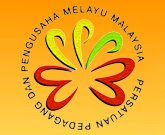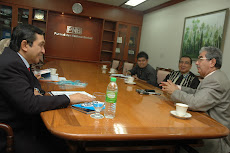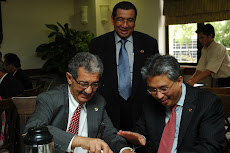God willing, thanks to Allah Subhanahu Wa Ta'ala because with his consent we are gathered this morning, at Dewan Agong Tuanku Canselor of Universiti Teknologi MARA's Main Campus, an institution which symbolises and is a symbolism of the relentless struggle of the Malays and Bumiputera.
First of all, on behalf of the government, I record the highest appreciation to the people of Malaysia especially the Malay and Bumiputera comunities who had supported, given their mandate and trust to Barisan Nasional at the 13th General Election..to continue the leadership of the nation. What is more overwhelming is, Umno as the mainstay of Barisan Nasional, had been able to increase its parliamentary seat from 79 to 88.
This proved, regardless of the obstacle, despite the accusations, the Umno Transformation Leadership, with the other Barisan Nasional component parties continued to be strong, continued to be firm and continued to endure efficaciously, as the pick of the people, for the next five years ...to pursue the agenda of the Malays and Bumiputera in our beloved homeland.
After the last general election was concluded, we heard numerous grumblings, countless laments and dissatisfaction, raised by the Bumiputera communities, on their lot, future and direction, with their children and grandchildren in the land of our birth.
Indeed, we heard your cries, ladies and gentlemen. We too, immerse ourselves in your pulses and restlessness..Yes, indeed!!!...we hear you..we hear you loud and clear.
Since the nation became independent, on Aug 31, 1957, the people had lived in harmony, united, building the nation. On Sept 16, 1963, Sabah and Sarawak merged with us to form Malaysia. Thankfully, the unification, brought us a million blessings. Day after tomorrow, with the grace of god too, we will celebrate the completion of fifty years, Malaysia's golden jubilee celebration, which, god willing, I will be attending in the cities of Kuching and Kota Kinabalu.
To celebrate the population of the nation, there were 6.1 million Bumiputeras in 1970, or 56 per cent of the populace. The Malays comprised nine main ethnic groups, Orang Asli were divided into 18 categories, Sabah Bumiputras had 40 ethnic groups while Sarawak had 60 ethnic groups.
During the 2010 Umno General Assembly, I mentioned that Jawa is Malay, Bugis is Malay, Banjar is also mentioned as Malay, Minangkabau is definitely Malay, those of Acheh origin are Malays, in fact, a convert is defined as Malay, even Mamak and Malbari..have been absorbed as Malays.
The 2010 Population and Housing Census, showed Malays and Muslim Bumiputeras made up 59.7 per cent. While, non-Muslim Bumiputeras were 7.6 per cent of the overall populace. Current projections, as of 2012, estimated the population of Malaysia as 27.4 million people of whom Bumiputeras numbered 18.6 million or 67.9 per cent.
Since Independence, all the Malay and Bumiputera planning and economic policies by the government had been enacted based on the calculations founded on the composition of the plural communities. In principle, this had been adopted as a social contract since a long time ago by the people of Malaysia, as agreed to by the founding fathers of our nation, protected and articulated in the Federal Constitution through Article 153, Article 160 (2), Article 161A (6)(a). Also Article 161A (6)(b).
Therefore, the Malays and Bumiputeras as the core of the national agenda could not be denied by anybody. Indeed, any matter which is national in nature, which does not take into account or neglect the agenda of the Malays and Bumiputras is not fair and just.
It is important that this must be thoroughly understood by all quarters that we must always be aware and be careful about the Bumiputera Agenda being the National Agenda. This is because if the majority Bumiputera group are not looked after or felt themselves threatened and sidelined, the country may not achieve peace, stability, and we may not achieve our dream of becoming a developed nation which is peaceful and prosperous as aspired in 2020.
Thereupon, history has proven in the development of the national economy especially since the New Economic Policy was implemented, not only Malay and Bumiputera, in fact, all Malaysians shared the bounty from God, reaping the benefit together, the result of the national economic development. Clearly, this we had done without taking, or depriving anybody's right but rightly through the creation of new wealth and generating strong economic growth.
The chronicles of the world had shown how if a government failed to play its pro-active part in balancing socioeconomy fairly, between the haves and have-nots, between capitalists and workers, between land owners and tenants, between white collar workers and blue collar workers, it would be and is the harbinger of catastrophes.
In retrospect, the New Economic Policy, namely, NEP had been introduced in 1971 by the late Tun Abdul Razak, my father, to tackle the issue of inter-ethnic socioeconomic imbalances and poverty eradication following the May 13, 1969 tragedy.
That's how the New Economic Policy was implemented between 1971 and 1990. Since 1965 until 2010, 10 Malaysia plans and three long-term plans had been implemented.
The National Development Plan was between 1991 and 2000. Later, there was the National Vision Policy traversing 2001 to 2010. In the meantime, I also launched the National Transformation Policy, during the tabling of the 2010 Budget, as the axial reinforcement and a catalyst for achieving Vision 2020.
Since independence, the government had created numerous instruments and institutions for the Malays and Bumiputeras, among which were Bank Bumiputra, Tabung Haji, Mara, Felda, Risda, Felcra, UDA, Pernas, Dara, Jengka, Ketengah and Kesedar. The third prime minister, Tun Hussein Onn on his part, had set up Permodalan Nasional Berhad and launched Skim Amanah Saham Nasional.
As we also know, the interest of Bumiputera had been further strengthened by the fourth prime minister Tun Dr Mahathir (Mohamad) through the privatisation policy and Vision 2020, which became the current track on which the nation is progressing. The fifth prime minister, Tun Abdullah (Ahmad Badawi) had created corridors to boost regional economic development.
Since I took over the administration of the nation, the government had launched the New Economic Model, which aspired to turn Malaysia into a developed, high income nation, with balanced growth, witnessing the Malay and Bumiputera communities on a par with other communities with the advent of a developed nation status in seven years.
Furthermore, the New Economic Model introduces an inclusive development approach based on growth with equity to ensure all communities in Malaysia obtain benefit from economic development and the nation's riches.
Meanwhile, the 10th Malaysia Plan, starting from 2011 to 2015, is aimed at providing fair opportunities to all Malaysians, regardless of ethnic groups or geographical position, to be together involved in all economic activities. This is based on the principle of friendly market, based on need, transparency and merit. But the meritocracy here meant competition among Bumiputera.
The government had also introduced the Government Transformation Programme and Economic Transformation Programme to form a national economic development ecosystem which is strong and resilient. Due to the implementation of the transformation programme, the national economy had recorded a strong growth in an uncertain global economy. In 2011 and 2012, the rate of growth of the national economy was 5.1 and 5.6 per cent, respectively.
What I want to stress here, that is, continuous growth such as this is crucial, because, firstly, only with growth can we distribute the riches of the nation to all Malaysians.
Through a careful and wise economic planning, the standard of living of Bumiputeras has gone up. For example, the Bumiputera monthly average household income had gone up from RM172 in the 1970s to RM4,457 in 2012 or almost 2,500 per cent in 42 years.
The Bumiputera poverty rate had gone down from 64.8 per cent in the 1970s to 2.2 per cent in 2012. The Bumiputera corporate company equity rate had also gone up from only 2.4 per cent in the 1970s to 23.5 per cent in 2011.
Furthermore, except for several specific employment sectors, the number of Bumiputeras employed in the professional category, especially those qualified as medical doctors, engineers and lawyers had approached the percentages of the racial composition.
This proved the New Economic Policy, as a preliminary measure, had been successful in tackling the gap between the communities in the effort to develop the socioeconomy of the Bumiputera community. Clearly, during the last four decades, the Bumiputera community had entered the first phase of the transformation.
Nevertheless, the government is aware that there still exists disparity in income between the ethnic groups. For example, in 2011, the average monthly income of the Chinese was higher than Bumiputeras by a ratio of 1:43.
In the context of corporate company equity ownership, we have yet to achieve a target of at least 30 per cent. Our effective control of corporate companies currently is only around 10 per cent. The government also understands that the involvement of the Bumiputera communities in entrepreneurship activities is still insignificant and the majority are at the small and micro levels.
As such, on the support given by Malays and Bumiputeras in the 13th General Election recently, today the government decides to make a big shift to implement concrete and total strategies and approaches.
This meaningful and historic meeting, we name the Bumiputera Economic Empowerment Council. All these, we undertake, to look after the lot of the Malay and Bumiputera communities, since the past, presently and forever. The Empowerment of the Bumiputera Economy focuses on five major strategies.
Enabling Bumiputera human capital
As we understand, human capital is the most important aspect in developing a community. The government, in truth, had been successful in emplacing Bumiputera students in local and foreign public institutions of higher learning. As such, the next phase is to empower the Bumiputera human capital leading towards matching qualifications and skills with the needs of the market.
Towards this end, firstly, for youths with low academic qualifications and skill levels, the government had increased skills boosting programmes to provide a second chance so they would have more opportunities to get employment.
In this aspect too, reskilling programmes are escalated. Towards this end, additional allocations would be given to GiatMara to procure the latest high technology equipment to carry out training programmes. Meanwhile, the number of training programmes handled by the National Youth Skills Institute would also be increased by adopting the two shifts approach.
Secondly, to the unemployed Bumiputera graduates, the government will intensify training programmes to boost their marketability, to suit the needs of the industry. For this purpose, programmes such as 1Malaysia Training Scheme, Graduate Employability Management Scheme and Skills Steering Programme would be expanded to boost the number of beneficiaries.
Thirdly, to boost the number of highly qualified individuals, related agencies such as the Public Service Department and Mara would expand Post Degree Education Programmes to meet the needs of the market especially in critical and high technology sectors.
Fourthly, in turning out more Bumiputera professionals, Professional Leadership Programmes under the Bumiputera Education Steering Foundation (YPPB) and similar programmes would be expanded. This will help them obtain recognition as professional and accredited manpower, especially in critical areas such as accountancy, specialist doctors, architecture, engineering and actuarial science.
Strengthening the Bumiputera equity ownership in the private sector
To date, the maximum limit for each individual in Amanah Saham Bumiputera investment is RM200,000. As such, to encourage participation, especially among the middle Bumiputera group in owning shares, I proudly announce the Skim Amanah Saham Bumiputera 2 or ASB2 would be launched by Permodalan Nasional Berhad with an injection of 10 billion units of shares.
Equinas, on its part, will be given the responsibility of taking over the role of spearheading the Skim Jejak Jaya Bumiputera programme. The programme would be transformed through management equity and skill, to guide Bumiputera companies for listing on Bursa Malaysia.
Strengthening Bumiputera non-financial assets
Bumiputeras are still lagging in non-financial asset ownership such as houses, industrial premises and commercial complexes. For example, in 2012, the transaction of residential homes recorded by the National Property Information Centre, indicated only 36.3 per cent of transactions of residential homes involving Bumiputeras with a value of almost RM18 billion or 26 per cent.
From another angle, many non-financial assets such as property among Muslim Bumiputeras, which were not managed in an orderly manner or neglected had caused the value of the assets to become low. As such, to optimise the value and benefit of the assets, for starters, Malaysian Wakaf Foundation would be spruced up and upgraded into a corporate entity.
Property institutions such as Pelaburan Hartanah Berhad, Majlis Amanah Rakyat and Perbadanan Usahawan Nasional Berhad would be empowered to develop or obtain commercial and industrial property especially at strategic locations nationwide.
In addition, the government is aware the capability of the Bumiputera communities to own homes is low on top of the increasing prices of houses. Towards empowering property ownership, to generate Bumiputera wealth, the government through Syarikat Perumahan Rakyat 1Malaysia or PR1MA and Syarikat Perumahan Negara Berhad with the cooperation of the state governments, would increase the number of affordable homes for Bumiputeras nationwide.
Meanwhile, according to statistics, 58 per cent of the 72 per cent Malaysians staying in the urban areas are Bumiputeras. But, the government knows, the percentage of Bumiputera property ownership in town is low. So, without government intervention to correct the situation, the Bumiputera property ownership is becoming worse.
As such, the role of UDA Corporation would be strengthened to help the development of property including homes, complexes and trading spaces, industrial and commercial buildings in urban areas.
In connection with this too, I will direct GLCs and GLICs which are involved in the property sector to stress the development of Bumiputera property especially housing, shoplots and commercial premises.
Enhancing Bumiputera entreprenuership and commerce
As we all know, commerce and entrepreneurship are the most important activities to generate income and riches. However, the participation of Bumiputras in such activities is low because of several constraints faced including outdated production technology, lack of access to funds and capital and limited markets.
In overcoming the issue of access to financing funds for small and medium entrepreneurs, the roles of Bumiputera entrepreneur agencies such as Amanah Ikhtiar Malaysia, Tekun Nasional, Mara and PUNB would be strengthened so that the number of Bumiputera entrepreneur recipients would increase, including in Sabah and Sarawak.
In this regard, I am happy to announce, an additional allocation of RM300 million for Amanah Ikhtiar Malaysia for five years. The number of friends of Amanah Ikhtiar Malaysia, the majority of whom are women, is targeted to rise from 350,000 people to 500,000 people in 2015.
At this opportunity too, I announce an additional allocation of RM700 million for Tekun Nasional. The number of Tekun entrepreneurs is also expected to go up from 270,000 this year to 370,000 in 2015.
In response to the lament of entrepreneurs who were encountering problems of market access, I will direct all ministries and GLC to strengthen their Bumiputera vendor development systems. The selection of vendors must be based on merit among Bumiputeras. In this manner, Bumiputera entrepreneurs could be capable of becoming strong and progressive.
In line with this, I also want the vendor contract and concession periods to be synchronised with the bank loan repayment periods so their projects could run smoothly.
In connection with empowering the Vendor Development Programme or VDP, Petronas must boost its VDP programme, to strengthen its supply chain for the oil and gas sectors. The same goes for Tenaga Nasional in the energy sector, Telekom Malaysia and AXIATA in the communications sector, UEM in construction while Sime Darby and Felda Global Ventures for the plantation sector.
With the empowerment of the Bumiputera economy too, I want all chief executive officers in GLCs to fix targets on the participation of Bumiputeras including acquisitions awarded to vendors. This should be included in the Key Peformance Index for the chief executive officers of the respective companies.
In this regard, I am happy to share that in the oil and gas sector between now and 2017, Petronas is implementing and will carry out several main upstream and downstream projects. Through these projects, we have worked out so that Bumiputera companies would benefit from contracts worth RM20 billion each year for upstream and downstream service work.
The shelf life of such facilities are usually about 25 years or more. It is estimated at least 22 critical work scopes would be created to benefit Bumiputera companies.
To tackle the issue of supply chain, the government through GLC and GLIC would develop a group of Bumiputera entrepreneurs who would involve themselves in activities related to manufacturing and industrialisation which have potential and higher value-added. In this context, GLC and GLIC would helm efforts to create several Bumiputera consortiums in the sectors involved.
The privatisation programme, generally, had succeeded in becoming catalysts to create successful Bumiputera individuals and companies. As such, to escalate the programme, the Private Public Cooperation Unit, or UKAS, will take the initiative to identify selectively any viable government service to be privatised to Bumiputeras.
In a move to ensure opportunities for Bumiputera companies to obtain contracts and in preparation to compete in the future, the carve-out policy would be expanded to other big projects under the ministry, GLCs and GLICs. This policy was successfully carried out in the MRT projects where 47 per cent or RM9 billion was awarded to Bumiputera companies selected on merit.
For example, four additional projects which had been identified to take part in the programme are Merdeka Heritage Tower Project, Bukit Bintang City Centre, MATRADE Exhibition Centre and the Sungai Buluh Rubber Research Institute Development programme.
In furtherance of the agenda, it is appropriate that we build a New Bumiputera Entrepreneur Community that is resilient, competitive, innovative and daring to take risks. They also must have a deep interest and are passionate about participating in new knowledge-based fields such as information technology, biotechnology and green technology.
Towards this aim, a new and unique financing scheme named Bumiputera New Entrepreneurs Starting Scheme or SUPERB would be introduced. The scheme is aimed at aiding start-up companies. For this purpose, an allocation of RM100 million would be provided in a three-year period.
SUPERB will provide grants up to RM500,000 to creative and innovative new entrepreneurs in strategic sectors which have big potential in the future.
The selection of Bumiputera entrepreneurs would be based on merit and would be done by a panel of entrepreneurs who are already successful. Furthermore, new entrepreneurs who were picked would also be mentored by those who were already successful.
Strengthening the service delivery ecosystem
As I have mentioned, the government hears the expressions of feelings emanating from the Bumiputera communities on their level of participation in socioeconomic development programmes. As such, to ensure the socioeconomic development of Bumiputeras is effectively implemented, the delivery system would be streamlined and compacted to create an efficient, comprehensive and constructive ecosystem.
For this, the Bumiputera Development Units, or UPB, would be created in all ministries. The Bumiputera Development Unit is responsible for formulating suggestions and implementing Bumiputera Agenda initiatives.
Appreciating the interest and struggles of Bumiputeras, I wish to quote seven wills by the Nine Malay Rulers when consenting to the independence agreement to set up a federation.
Truly:
"We declare and we keep for you and we allow you to declare and keep for your children and grandchildren, other than the mountains, lakes and forest reserves, Malay Reserve land up to a ratio of 50 per cent, the rest you, together with the other communities, may grab".
This will is very clear. It has stated the equity and the ownership of the Malays and later expanded to Bumiputeras, through the unification of Sabah and Sarawak when Malaysia was set up 50 years ago.
Certainly!... We are doing what is fair,... we are doing what is right..., and we are doing what is equitable. It means, we do not have any intention or prejudice against other races.
As such, what is in my heart and the government's aspiration is a noble intention to continue creating new wealth, so that all people of Malaysia can share the benefits in a fair and just manner.
In fact, the peace and harmony between our people has enabled us to be ranked 20th among the most stable and peaceful countries in the world. That is how special and unique Malaysia is.
The main point I want to emphasise here is that we are a wise and responsible government for the people from all walks of life, regardless of their background, Bumiputera or non-Bumiputera, Muslims or non-Muslims.
We are nothing like certain politicians who continue fanning racial fires to the extent of scaring and confusing the people's mind.
Like it or not, if we are not careful and let ourselves be influenced by foreign sentiments, through these masterminds and enemy within, we will suffer the consequences. If we leave it unaddressed, Malaysia, as an independent and sovereign state, will perish...God forbid.
As I said earlier, we are gathered here with a mission...not for fun...As UiTM's slogan says 'UiTM Dihatiku' (UiTM in My Heart)... it means that Universiti Teknologi Mara is very close to our hearts, as a most prominent Bumiputera institution.
In fact, I can vividly remember the time when I delivered a speech as Umno deputy president at the party's general assembly in 2005... I called for the UiTM's student enrolment to be increased from 100,000 to 200,000 by 2015. Now, all praise be to Allah, the number has reached 180,000.
Today, I want to announce the target to see a further increase in UiTM's student enrolment to 250,000 by 2020. Plans are also afoot to open several new UiTM branch campuses nationwide.
For Malays... For Bumiputeras... I want to announce the setting up of a RM1 billion Mara Education Fund to meet financial requirements for training programmes, education, entrepreneurship, research and development and innovation. The fund will be channelled in stages in the form of a 'matching fund' with a one-to-one ratio between the government and Mara.
We also realise that the Bumiputera community has high hopes on Teraju to lead the Bumiputera development agenda. Now, to make Teraju a more distinguished body, it will be put directly under my supervision as the prime minister, and that it will be led by .......................
In achieving our aspiration to establish a Bumiputera Entrepreneur Community, I would also like to announce that the National Entrepreneurship Institute or INSKEN will be put under Teraju's supervision, so is the Bumiputera New Entrepreneurs Start-Up Scheme or SUPERB which I had announced earlier.
As the umbrella body and the peak strategy for the empowerment of the Bumiputera Economy, a council, to be called the Bumiputera Economic Council (MEB), will be set up to replace the Bumiputera Agenda Action Council (MTAB). The MEB will be chaired by myself and its deputy chairman will be the deputy prime minister with members comprising the relevant ministers. The membership is compact where various representatives from non-governmental organisations and relevant agencies will be invited. The important council will meet at least once a month or more.
So, with the Bumiputera Economic Council as the pillar for the Malays and Bumiputeras... there is no need to worry because......as long as there is the moon and the stars......for as long as we shall live......the survival of the Malays and Bumiputeras will remain a priority and light of our struggle.
Finally, I pledge that I will continue to empower the Malay and Bumiputera economy. God willing, all these will be achieved.
Read more: Najib: We hear the cries of Bumi communities - General - New Straits Times http://www.nst.com.my/nation/general/najib-we-hear-the-cries-of-bumi-communities-1.356220?cache=03%2F7.229581%2F7.253657%2F7.288063%2F7.301483%2F7.480298%2F7.480850%2F7.480850%2F7.480850%2F7.502513%2F7.502513%2F7.502513#ixzz2evVHumG4





































































